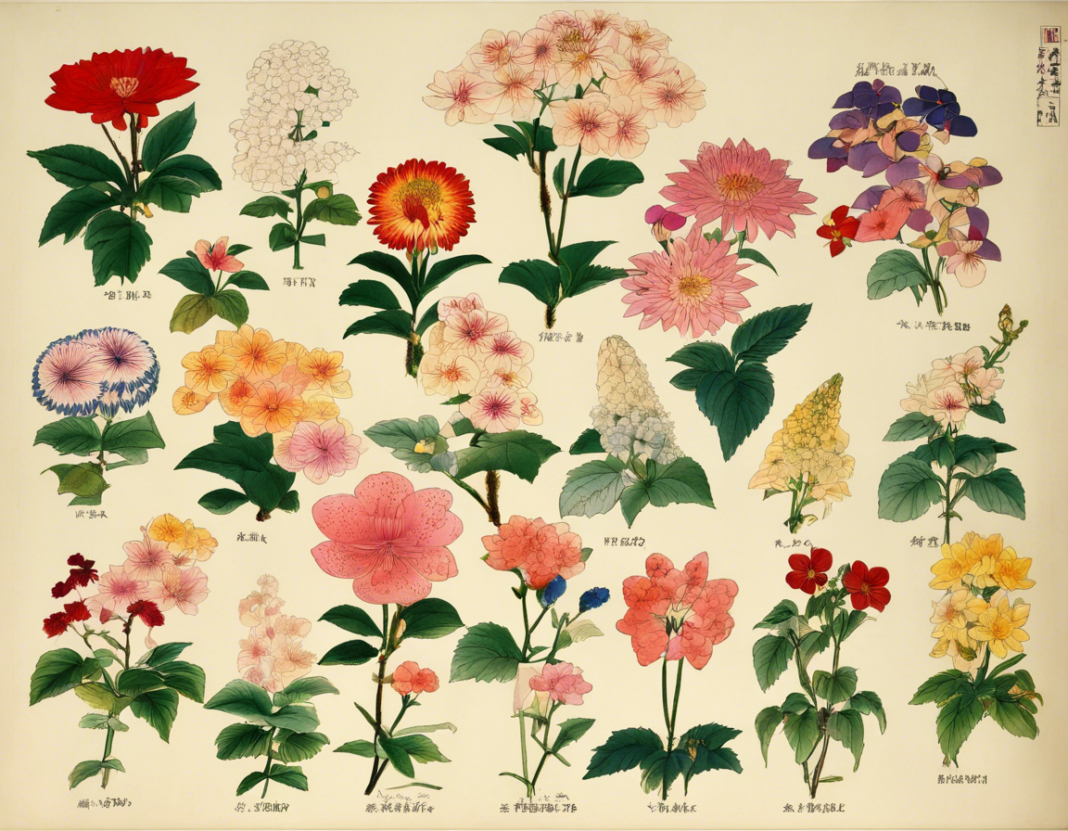When it comes to finding inspiration for a beautiful and meaningful name, Japanese flower names can offer a unique and elegant choice. In Japanese culture, flowers hold significant symbolism and are often associated with various virtues, emotions, and natural elements. Each flower has its own distinct beauty and meaning, making it a popular source of inspiration for names. Whether you have a special connection to a particular flower or you simply appreciate the rich and diverse floral heritage of Japan, exploring Japanese flower names can be a delightful journey that leads to finding the perfect name for your child, character, pet, or even your business. Let’s delve into the captivating world of Japanese flower names and discover the stories and meanings behind some of the most beloved blooms.
Hanakotoba: The Language of Flowers in Japan
In Japan, flowers have long been used to convey messages and express emotions through a practice known as hanakotoba, or the language of flowers. Each flower is believed to represent specific sentiments and characteristics, allowing people to communicate their feelings and thoughts symbolically. From admiration and gratitude to love and sorrow, Japanese flower names are infused with deep cultural significance and poetic symbolism. By choosing a name inspired by a particular flower, you can imbue it with layers of meaning and create a connection to nature and tradition.
Sakura (Cherry Blossom)
Sakura, or cherry blossom, holds a revered position in Japanese culture and is perhaps the most iconic and cherished flower in the country. Symbolizing transience, beauty, and the evanescence of life, cherry blossoms captivate with their delicate pink and white petals that blanket the landscape in a breathtaking display each spring. Naming your child or character Sakura can evoke a sense of fleeting beauty and the fleeting nature of existence, reminding us to appreciate the present moment and cherish the beauty that surrounds us.
Ume (Plum Blossom)
The ume, or plum blossom, is another beloved flower in Japan that symbolizes endurance, purity, and renewal. Blooming in late winter or early spring, the delicate white or pink blossoms of the plum tree represent resilience and hope in the face of adversity. Naming your pet or business Ume can signify strength, perseverance, and the promise of new beginnings, making it a meaningful choice for those embarking on a fresh chapter in their lives.
Ayame (Iris)
The ayame, or iris, is a striking and elegant flower that symbolizes courage, wisdom, and admiration in Japanese culture. With its sword-like leaves and vibrant hues, the iris represents the inner strength and nobility of character. Choosing the name Ayame for your child, character, or business can convey a sense of bravery, intellect, and esteem, embodying the essence of this graceful flower.
Botan (Peony)
The botan, or peony, is a symbol of prosperity, good fortune, and romance in Japanese tradition. With its lush petals and vibrant colors, the peony is associated with wealth, success, and happiness. Naming your child, pet, or business Botan can attract positive energy and blessings, bringing abundance and love into your life.
Hana (Flower)
The name Hana, which simply means flower in Japanese, is a versatile and timeless choice that celebrates the beauty and ephemeral nature of nature’s creations. By choosing the name Hana for your child, character, or project, you can pay homage to the richness and diversity of the natural world, embracing the interconnectedness of all living things.
Frequently Asked Questions (FAQs)
-
What are some other popular Japanese flower names besides Sakura and Ume?
In addition to Sakura and Ume, popular Japanese flower names include Ayame (iris), Botan (peony), Ran (orchid), and Sumire (violet). -
Do Japanese flower names have specific gender associations?
While some Japanese flower names are considered more feminine or masculine, many names can be unisex or adapted to suit individual preferences. -
Are Japanese flower names only used for people or can they be used for pets and businesses too?
Japanese flower names can be used for people, pets, businesses, and even fictional characters, offering a versatile and symbolic choice for naming various entities. -
How can I find the perfect Japanese flower name that resonates with me?
Exploring the meanings and symbolism of different Japanese flowers, as well as considering your personal connections and preferences, can help you find a name that resonates with your values and aspirations. -
Are there any cultural considerations to keep in mind when choosing a Japanese flower name?
While Japanese flower names can be a beautiful and meaningful choice, it’s essential to respect the cultural significance and history of these names and ensure they are used with appreciation and understanding. -
Can I combine Japanese flower names with other words or elements to create a unique name?
Yes, you can combine Japanese flower names with other words, elements, or names to create a unique and personalized name that reflects your individual style and identity. -
Do Japanese flower names have specific pronunciations or variations in different regions of Japan?
While Japanese flower names generally have standard pronunciations, there may be regional variations or dialectical differences in how these names are spoken or interpreted. -
Are there any seasonal considerations when choosing a Japanese flower name?
Some Japanese flowers are associated with specific seasons or occasions, so you may choose a name based on the significance of a particular flower blooming during a certain time of year. -
What are the historical and cultural origins of hanakotoba in Japanese tradition?
Hanakotoba has its roots in ancient Japanese customs and poetry, where flowers were used to convey emotions, express sentiments, and communicate subtle messages in a symbolic language known as “hanaawase.” -
Can I incorporate Japanese flower symbolism into other aspects of my life, such as art, design, or celebrations?
Absolutely! Japanese flower symbolism can inspire creative pursuits, design aesthetics, and meaningful celebrations, allowing you to infuse your surroundings with the elegance and significance of these cherished blooms.
Conclusion
By exploring the enchanting world of Japanese flower names, you can discover a wealth of inspiration, symbolism, and beauty that transcends language and borders. Whether you are drawn to the delicate petals of cherry blossoms, the regal presence of irises, or the opulent blooms of peonies, each Japanese flower name carries a story, a sentiment, and a connection to nature’s timeless beauty. Embrace the poetic language of flowers and imbue your life with the grace, resilience, and abundance symbolized by these exquisite blooms. Let the essence of Japanese flowers bloom in your heart and soul, enriching your journey with meaning and artistry.






